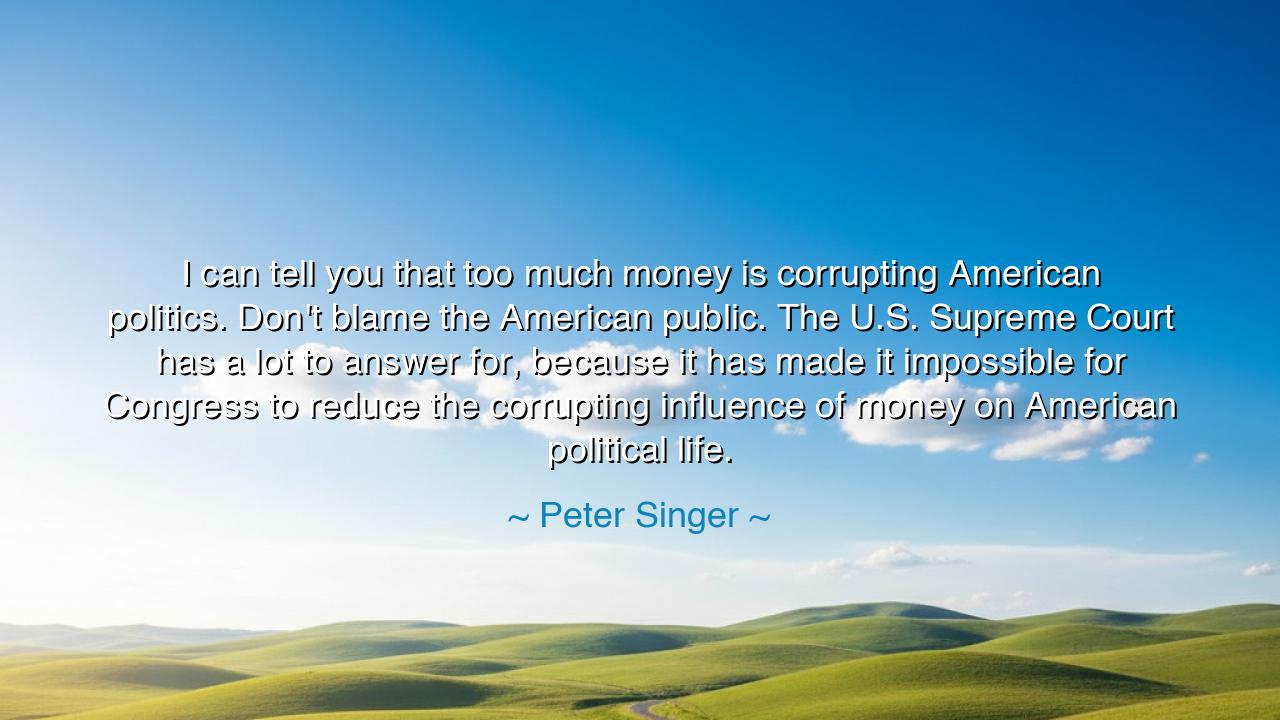
I can tell you that too much money is corrupting American
I can tell you that too much money is corrupting American politics. Don't blame the American public. The U.S. Supreme Court has a lot to answer for, because it has made it impossible for Congress to reduce the corrupting influence of money on American political life.






Hearken, children of the ages, and heed the words of Peter Singer: “I can tell you that too much money is corrupting American politics. Don't blame the American public. The U.S. Supreme Court has a lot to answer for, because it has made it impossible for Congress to reduce the corrupting influence of money on American political life.” In this utterance lies the eternal warning about the perils of wealth, influence, and the distortion of justice. Money, when unbridled in the affairs of governance, becomes a force that warps morality, silences virtue, and elevates power over principle. Singer reminds us that corruption is not always the failing of the people, but of systems that allow greed to overshadow the public good.
The origin of this insight arises from Singer’s scrutiny of modern American democracy, where he observes the interplay between wealth, law, and political power. As a moral philosopher, he discerns the structural injustice that permits enormous sums of money to dictate political outcomes, while ordinary citizens, though virtuous and engaged, are left voiceless. His critique is aimed not at the hearts of men, but at the frameworks of law and governance that enable corruption to flourish.
Consider the tale of the Gilded Age in the United States, when industrial magnates like John D. Rockefeller and Cornelius Vanderbilt wielded vast fortunes to influence legislation and elections. The halls of Congress, though filled with elected representatives, often bowed to the pressure of wealth and patronage, revealing how money can bend even democratic institutions. This mirrors Singer’s caution: when financial power eclipses ethical governance, the voice of the people is muffled, and the sanctity of politics is compromised.
Even in contemporary times, the surge of political action committees and corporate lobbying exemplifies Singer’s warning. Policies and elections can be swayed not by the will of the public, but by those with deep coffers and strategic influence. The Supreme Court’s rulings, particularly in cases such as Citizens United, have amplified the power of money, making it nearly impossible for Congress to enact reforms that would restore fairness. This illustrates the timeless truth: systems may amplify corruption, even when individual citizens remain righteous.
History is replete with those who resisted such corruption. Abraham Lincoln, navigating a divided nation and the influence of vested interests, sought to uphold principle over personal gain. Though pressures abounded, he demonstrated that courage, integrity, and moral clarity could counterbalance the corrupting sway of wealth. Singer’s words call us to remember that vigilance, reform, and ethical steadfastness are necessary to preserve the sanctity of public life.
Therefore, children of future generations, take this counsel to heart: guard your institutions and your laws against the corrosive power of unchecked wealth. Understand that corruption often stems not from the people, but from systems that allow influence to overshadow virtue. In striving for justice, transparency, and fairness, you honor the eternal principle that politics must serve the common good, lest it fall prey to the temptations of gold and power.






HAHoang Thi Hong An
Comparisons might help. Some democracies use shorter campaign seasons, donation ceilings, or generous public subsidies to shift incentives. Could a pilot city here test a voucher program plus strict disclosure and publish results on turnout, candidate diversity, and voter trust over three cycles? I’d want rollback triggers if unintended consequences appear (e.g., consolidation of power by well-organized insiders). Open question: if we can only try one reform next year, which has the best cost-benefit profile—vouchers, small-donor matching, or platform-level transparency mandates?
HNnguyen thai hoang nguyen
The digital layer worries me most. Microtargeted ads, shell entities, and rapid money flows make accountability slippery. What would workable transparency look like—platform-wide ad libraries with creative, spend, and targeting fields; machine-readable receipts linking to ultimate funders; and routine, random hand audits? I’m also wondering about data hygiene: identity checks to prevent straw donors yet protect privacy. Closed question: should jurisdictions require near real-time reporting (say, within 24 hours) for any election-related expenditure above a modest amount during the final campaign window?
DUDung Ung
I keep asking what we mean by “corruption.” Is it only quid-pro-quo bribery, or also a slow dependency where officials anticipate donor preferences? If the latter, we need better diagnostics. Could we track policy outcomes against median-voter preferences, measure lobbyist access patterns, and audit how often lawmakers meet small donors vs. large spenders? I’d love a public “influence ledger” that reveals who’s in the room. Open question: if such metrics showed skew, what remedy should trigger—spending caps, vouchers, or committee reforms?
DHNguyen Duc Hieu
As a reader, I’m torn between constitutional ideals and practical consequences. If court doctrine treats spending as protected expression, how do we curb distortions without muzzling genuine voices? I’m curious about a middle path: universal, real-time disclosure above a low threshold, small-donor matching to dilute whale money, and hard bans on coordination disguised as “independence.” Closed question: would you back a constitutional amendment narrowly scoped to allow reasonable limits on election spending, or do you prefer building guardrails entirely through transparency and public financing?